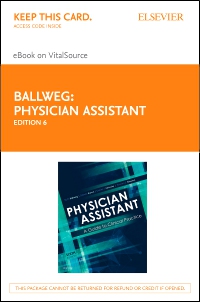
Physician Assistant: A Guide to Clinical Practice Elsevier eBook on VitalSource (Retail Access Card), 6th Edition
Elsevier eBook on VitalSource - Access Card

-
- Teaches how to prepare for each core clinical rotation and common electives, as well as how to work with atypical patient populations such as homeless patients and patients with disabilities.
- A succinct, bulleted writing style; convenient tables; practical case studies; and clinical application questions throughout enable you to master key concepts and clinical applications.
- Helps you master all the core competencies needed for certification or recertification.
-
- Addresses all six Physician Assistant Competencies, as well as providing guidance for the newly graduated PA entering practice.
- Includes quick-use resources, such as objectives and key points sections for each chapter, tip boxes with useful advice, abundant tables and images, and 134 updated case studies.
- Features chapters for the 7 core clinical rotations and 5 common electives, with key guidance on how to prepare effectively and what to expect.
- Provides updated health policy information, expanded information about international programs, cultural competencies, and pearls and pitfalls on working internationally as a PA.
- Outlines the basic principles of Interprofessional Education – an important new trend in medical education nationally.
- New chapters cover: Maximizing Your Education, Future of the Profession, Principles of PA Education, Managing Stress and Burnout, and many other topics.
- Expert Consult eBook version included with purchase. This enhanced eBook experience allows you to search all of the text, figures, images, and references from the book on a variety of devices.
-
Section I Overview
1. Maximizing Your Physician Assistant Education
2. History of the Profession and Current Trends
3. International Development of the Physician Assistant Profession
4. Physician Assistant Education: Past, Present, and Future Challenges
5. Safety in Clinical Settings
6. Assuring Quality for Physician Assistants: Accreditation, Certification, Licensing, and Privileging
7. Physician Assistant Relationship to Physicians
8. Healthcare Financing and Reimbursement
9. The Political Process
10. Interprofessional Practice and Education
Section 2 Medical Knowledge
11. Evidence-Based Medicine
12. Research and the Physician Assistant
13. Keeping People Healthy
14. Clinical Procedures
15. Genetic and Genomic Applications in Clinical Practice
16. Chronic Care Perspectives
17. Considerations for a Logical Approach to Medication Prescribing
18. Complementary and Integrative Health
19. Geriatric Medicine
20. End-of-Life Issues
Section 3 Interpersonal and Communication Skills
21. Communication Issues
22. Electronic Health Record
23. Patient Education
24. Providing Culturally Competent Health Care
Section 4 Patient Care: Clinical Rotations
25. Family Medicine
26. Internal Medicine
27. Women's Health
28. Pediatrics
29. Behavioral Science and Medicine: Essentials in Practice
30. Surgery
31. Emergency Medicine
32. Elective Rotations
A. Cardiology
B. Dermatology
C. Orthopedics
D. Oncology
E. Other Medical Subspecialties
F. Other Surgical Subspecialties
Section 5 Professionalism
33. Professionalism
34. Clinical Ethics
35. Medical Malpractice and Risk Management
36. Postgraduate Clinical Training Programs for Physician Assistants
37. Managing Stress and Burnout
Section 6 Practice-Based Learning and Improvement
38. Health Disparities
39. Patient Safety and Quality of Care
Section 7 Systems-Based Practice
40. Health and Health Care Delivery Systems
41. Rehabilitative and Long-Term Care Systems
42. Health Care for the Homeless
43. Correctional Medicine
44. Military Medicine
45. Inner-City Health Care
46. Rural Health Care
47. International Health Care
48. Patients with Disabilities
49. Mass Casualty Natural Disaster
Section 8 Your Physician Assistant Career
50. Leadership Skills for Physician Assistants
51.Be a Physician Assistant Educator
52. Professional Service
53. The Future of the Physician Assistant
Appendix: Link to ARC-PA Website